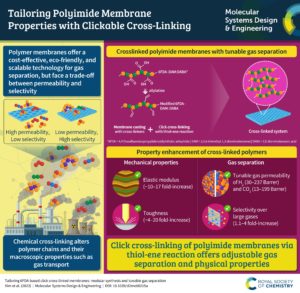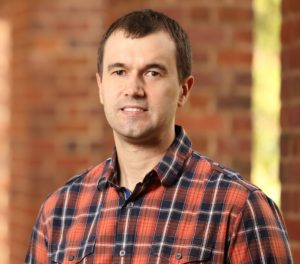Read Edward’s Emerging Investigator manuscript: A physics-inspired approach to the understanding of molecular representations and models, DOI:10.1039/D3ME00189J
This is an Open Access article and free to read!
Follow Edward on Linkedin.
Read Edward’s Emerging Investigator manuscript: A physics-inspired approach to the understanding of molecular representations and models, DOI:10.1039/D3ME00189J
This is an Open Access article and free to read!
Follow Edward on Linkedin.
Read Yongchul’s Emerging Investigator manuscript: Recent advances in software tools for adsorption science and engineering, DOI:10.1039/D2ME00036A
This will be free to read until May 30th! Read the interview with Yongchul below;
1. How do you feel about MSDE as a place to publish research on this topic?
I find articles published in MSDE to be useful and high-impact. I frequently refer articles from MSDE to members of my group. I think MSDE is a great place to publish multiscale modeling studies.
2. What aspect of your work are you most excited about at the moment and what do you find most challenging about your research?
I am excited about the possibility of multiscale modeling in the future, where the information from molecular simulation is used in device or unit operation levels to truly evaluate the performance of materials and accelerate the overall materials discovery process. The current challenge is availability of open-source software tools for modeling at the systems level. Majority of the research is done using commercial softwares and even if the software has been developed, it is not widely adopted in the community to share their code. I hope this will change in the future to truly accelerate scientific and engineering progress.
3. In your opinion, what are the most important questions to be asked/answered in this field of research?
I think the most important question right now is what can we do about carbon dioxide. There are many technologies being reported in the literature, but when will we see widespread adoption (not just a test site) soon to really make the difference? Also we should think about energy transition. If we are going to use energy from renewable sources, what should we do with current infrastructure for oil/gas? Where will we get carbon from to make consumer goods? Many people are working in these areas and I hope to see answers to these questions in the next decade.
Follow Yongchul on X (formally Twitter); @DrYGChung
It is with our great pleasure to announce Prof. Hyungwoo Kim & Prof. Won Seok Chi (Chonnam National University, Korea) as the joint winners of the 2023 Molecular Systems Design & Engineering Outstanding Early-Career Paper Award.
This is in recognition of her leadership of the paper, ‘Tailoring 6FDA-based click cross-linked membranes: modular synthesis and tunable gas separation’, DOI: 10.1039/D2ME00215A
Check out this bespoke infographic summarising the paper;

About the winners:
Check out our interview with Professor’s Kim & Chi below:
Can you briefly summarise your paper?
This paper describes rationally designed click-crosslinked 6FDA-DAM:DABA membranes using a thiol-ene cross-linking method for tunable molecular separation performance. The systematically controlled thiol cross-linkers were introduced to engineer the d-spacing and fractional free volume of click-crosslinked polymer membranes. As a result, the gas transport properties of the modular engineered click-crosslinked membranes were finely controlled depending on the thiol cross-linker. Moreover, the click-crosslinked membranes showed enhanced plasticization resistance depending on the crosslinker chain length or cross-linkable site numbers.
What aspect of your work are you most excited about at the moment?
Chi – My work focuses on functional polymer membranes and metal-organic framework (MOF) mixed-matrix membranes (MMMs) for gas separation. In particular, the rational design of the functional polymer membranes and the engineered MOF-polymer interface of the MMM can achieve significantly enhanced gas transport properties. In addition, the increased polymer chain rigidity of the polymer-based membranes can suppress the plasticization phenomenon, which is a critical issue of membrane-based separation in the industrial field.
Kim – I am conducting research on designing functional polymer materials in the field of polymer synthesis. It is very rewarding to see polymers specifically designed at the molecular level functioning as a useful material.
Where do you see the field of cross-linked membranes in five years’ time?
The cross-linking approach for polymer membranes can engineer the d-spacing of polymer membranes and reduce the polymer chain mobility. The fine-tuning of the fractional free volume of polymer membranes can be achieved showing their tunable gas transport properties. In addition, the cross-linked polymer membranes can suppress the plasticization behavior, which results in the polymer chain relaxation at highly soluble gas feed pressure, by forming a rigid polymer network from the cross-linking.
How do you feel about Molecular Systems Design & Engineering as a place to publish research on this topic?
MSDE focuses on the research work on the molecular engineering of the chemical structure of polymer materials and their corresponding transport properties. This work provides a deep understanding of the principle structure-to-transport relationship, thereby achieving a highly efficient and stable gas separation performance for industrial applications.
How do you like to spend your time when not doing research?
Chi – I enjoy taking a walk and watching a movie. Sometimes, I also enjoy traveling to rural places and abroad and hiking national parks.
Kim – I love spending time with my family. We like cooking and traveling together. Also, I like listening to all kinds of music and visiting art museums
Can you share one piece of career-related advice for those beginning their research career?
Chi – Provide abundant assistance and support for collaborators, and then it will fulfill your research as well. This work was also performed by the collaboration.
Kim – I agree to the Chi’s comment. Sometimes research can be tedious but together you can go further.
Read the paper for FREE until 29th Arpil 2024!
Tailoring 6FDA-based click cross-linked membranes: modular synthesis and tunable gas separation
Jieun Park, Chang Oh Lee, Ki Jung Kim, Won Seok Chi* & Hyungwoo Kim*
Mol. Syst. Des. Eng., 2023, 8, 32-38, DOI: 10.1039/D2ME00215A
About the award
The aim of the Molecular Systems Design & Engineering Outstanding Early-Career Paper Award is to recognise a researcher in the earlier stages of their research career for their leadership in reporting original research published in the journal.
The journal Editorial Board award this prize annually, selecting the paper which they find to demonstrate the highest quality of research, as well as importance to the advancement of the field of molecular engineering, out of all qualifying papers published in the journal each year.
Eligibility
In order to be eligible for this award, the candidate must:
|
 |
Selection Process
To choose the winner of the 2023 Molecular Systems Design & Engineering Outstanding Early-Career Paper Award, a shortlist of eligible articles that were published throughout the year were selected by the editorial office and then subsequently assessed by the journal’s Editorial Board. The winner was selected based upon the significance, impact and quality of the research.
Prize
The winner of the Molecular Systems Design & Engineering Outstanding Early-Career Paper Award will receive an engraved plaque, a bespoke infographic from Impact Science for the winning paper and £500 cash award that would be used for conference travel/attendance of their choice.
To have your paper considered for the 2024 Molecular Systems Design & Engineering Outstanding Early-Career Paper Award, indicate when prompted upon submission of your revised manuscript if a corresponding author of the paper fulfils the criteria to feature in the Emerging Investigator Series. If accepted, your paper will be added to the ongoing collection and will be considered for the award. Multiple eligible authors of a winning paper will share the prize fund equally. You can contact the editors at molecularengineering-rsc@rsc.org if you have any queries.
Read Wenjie’s Emerging Investigator manuscript: Molecular insights into the hydration of zwitterionic polymers, DOI:10.1039/D3ME00020F
This will be free to read until September 20th! Read the interview with Wenjie below;
1. How do you feel about MSDE as a place to publish research on this topic?
MSDE presents an ideal platform to showcase our group research on modeling and computational design of molecules and polymers. With its reputation for upholding rigorous peer-review standards, MSDE provides a credible avenue to disseminate our research and contribute to the advancements in our field.
2. What aspect of your work are you most excited about at the moment and what do you find most challenging about your research?
I am thrilled by the potential that emerging and advanced computational techniques, such as multiscale modeling and AI, hold for predicting and designing complex molecular systems at a fundamental level. The most challenging aspect of my research lies in establishing an effective strategy to overcome the spatiotemporal limitations of molecular modeling to achieve improved predictions at extended and multiple scales in a computationally efficient manner.
3. In your opinion, what are the most important questions to be asked/answered in this field of research?
In design and engineering of complex molecular systems, such as zwitterionic polymers, the most important question to be answered is how to delineate their “structure-processing-property” relationships of those materials, which requires a fundamental understanding of their intricate intermolecular interactions and microstructures.
4. Can you share one piece of career-related advice or wisdom with other early career scientists?
From my personal experience, it is really valuable to cultivate a strong network of peers, mentors, and collaborators. Building meaningful connections within your field and even beyond really offers diverse perspectives, valuable guidance and tremendous opportunities for research collaboration.
Follow Wenjie on Twitter; @WenJXia
You can also find Wenjie on Linkedin: https://www.linkedin.com/in/wenjie-xia/
Read Shafigh’s Emerging Investigator Series article: Unraveling the impact of template geometry and confinement on template-assisted self-assembly of nanoparticles. DOI:10.1039/D3ME00024A
This article will be free to access until September 15th! Read the interview with Shafigh below;
In your opinion, what are the most important questions to be asked/answered in this field of research?
The challenging task in this field is to thoroughly understand the mechanisms of Directed Self-Assembly (DSA) of Sub-50 nm Particle (abbreviated as SNP) arrays on templates at moving three-phase (solid- liquid-gas) interfaces, and utilize that understanding to investigate ways to manipulate DSA and ordering of assemblages with single particle precision (placing a single particle at every predefined position). The DSA process is a self-assembling system of discrete components, which is aided by utilizing stimuli such as external fields or templates for selective depositions. This process is currently considered as one of the main ways for nano-fabrication because of its simplicity, versatility, and spontaneity. DSA of SNP arrays onto 2D structures gives rise to novel collective properties that can be tuned by manipulating the external stimuli, interactions between SNPs, or particle size. Arrays of SNPs, such as semiconductor quantum dots, nanorods, and nanotetrapods, with such tunable properties have applications in electronics, magnetics, photonics, and catalysis. Ordered arrays of SNPs on template surfaces will also influence the fundamental nanoscale view of materials properties and the practical manifestation of bottom-up manufacturing technologies. SNPs are promising building blocks for nanotechnology due to their ease of fabrication and high degree of uniformity. However, this promise will be fulfilled only if a method to address single SNPs and their positioning in large arrays with desired arrangement on textured substrates is developed. To develop this method, a rigorous understanding of the mechanisms of DSA of SNP arrays on template surfaces is required.
Find out more about Dr Shafigh Mehraeen and their groups research on their website: https://tranzabi.people.uic.edu/
Read Reika’s Emerging Investigator article: Recent advances and emerging opportunities in rapid thermal annealing (RTA) of polymers. DOI: 10.1039/D2ME00283C
This article will be free to access for all until September 10th 2023! Read the interview with Reika below;
Read Nick’s Emerging Investigator article, Electron and ion transport in semi-dilute conjugated polyelectrolytes: view from a coarse-grained tight binding model , DOI: 10.1039/D2ME00285J
At present I am most excited about trying to make quantum chemical predictions accessible to soft materials length scales (~10-100 nm), which are currently out of reach for traditional methods. These method development efforts typically require familiarity with state-of-the-art advances in machine learning, coarse-graining, and electronic structure calculations, which can be very difficult to keep on top of.
3. In your opinion, what are the most important questions to be asked/answered in this field of research?
The most important question that needs an answer in this field is if we can make coarse-grained electronic structure predictions as accurate and easy to use as traditional black-box quantum chemistry calculations. Time will tell!
4. Can you share one piece of career-related advice or wisdom with other early career scientists?
Follow the ideas that are YOUR ideas and that YOU are passionate about. Try not to let emerging research trends or fads distract you too much from what you are excited to be working on! The job is a lot more enjoyable when you are working on topics you love and not just trying to keep up with the Joneses.
 |
Hyungwoo Kim is an Associate Professor of polymer science and engineering at Chonnam National University. He specializes in polymer synthesis and his research interests include molecular design of polymers with autonomous responses, synthesis of sustainable polymeric materials, and control of microstructures in polymers. Before joining the current university as an Assistant Professor in 2017, he received his Ph.D. in materials science and engineering in 2014 from Seoul National University and did postdoctoral research in the Dept. of Chemistry at Pennsylvania State University.
Find out more about Hyungwoo’s research on his webpage Read Hyungwoo’s Emerging Investigator article, ‘Tailoring 6FDA-based click cross-linked membranes: modular synthesis and tunable gas separation‘, DOI: 10.1039/D2ME00215A How do you feel about MSDE as a place to publish research on this topic? MSDE is impressive for me. In general, when designing a material for a specific application, it is important to understand the underlying structure or mechanism, since it determines overall material properties. In this context, MSDE more focuses on fundamentals of research on a molecular level and of which the introductory part “design, system, application” particularly help readers catch the essential points. |
 |
Gary Koenig began an appointment as an Assistant Professor of Chemical Engineering at the University of Virginia in 2012, and was subsequently promoted to Associate Professor in 2018. In addition to teaching and professional service commitments, Gary is the principal investigator of a group which researches energy storage materials and systems. Gary completed a B.S. from The Ohio State University and then a Ph.D. from the University of Wisconsin-Madison, with both degrees in Chemical Engineering. Before starting at University of Virginia, Gary was a Postdoctoral Associate at Argonne National Laboratory. Gary has published over 50 research articles. His expertise span from probing fundamental materials properties to grid scale energy storage evaluation, and includes both experimental and simulation tools.
Find out more about Gary’s research on his webpage Follow Gary on Twitter at @ChemEBattery |
Read Gary Koenig’s Emerging Investigator article, ‘Improving high rate cycling limitations of thick sintered battery electrodes by mitigating molecular transport limitations through modifying electrode microstructure and electrolyte conductivity‘, DOI: 10.1039/D1ME00082A
1. How do you feel about MSDE as a place to publish research on this topic?
MSDE was a good fit for for this paper, given the breadth of the molecular systems audience and the applications/technology significance component of the journal scope, which fits well with the energy storage applications of our research.
2. What aspect of your work are you most excited about at the moment and what do you find most challenging about your research?
This work investigated an electrochemical system that has significant ion transport restrictions, and what is exciting is pushing the limits in such a system to understand how fast the overall electrochemical process can be driven. The most challenging aspect for this paper was identifying a suitable electrolyte to evaluate which improved the ion transport properties without causing other cell stability limitations.
3. In your opinion, what are the most important questions to be asked/answered in this field of research?
There are many in the broader field of battery research. Most specific to this research report is how to best optimize the trade-off between electrode designs that increase energy density while still maintaining reasonable charging times/rates. This ties in more broadly to other bigger challenges with regards to safety and reliability of battery cells.
Read Michael’s Emerging Investigator Series article, ‘Featurization Strategies for Polymer Sequence or Composition Design by Machine Learning’, DOI: 10.1039/D1ME00160D and check out his interview below
How do you feel about MSDE as a place to publish research on this topic?
MSDE was an appealing venue for us for a few different reasons. First, I appreciate the focus in scope at MSDE in that published articles need to specifically highlight a molecular design or optimisation strategy. Our work falls in the latter category, and our motivation for study is very much for the reason for enhancing the process of polymer sequence and/or composition design in the future. In addition, MSDE seems to welcome contributions at the interface of molecular science and machine learning, and so I thought the general readership would be good.
What aspect of your work are you most excited about at the moment and what do you find most challenging about your research?
I am particularly excited about designing triggered stimuli-response into polymers using tools from both molecular simulation and machine learning. The most pressing problem at the moment, in my view, is the inadequacy of underlying models of this behaviour and their chemical specificity. As a logistical challenge, I would say it is difficult to stay abreast of both relevant simulation and machine learning literature and effectively train my researchers to be competent and confident in both areas.
In your opinion, what are the most important questions to be asked/answered in this field of research?
I think we and others have been asking good questions in the field of polymer machine learning. What we need to do moving forward is address what our answers mean or how they need to change as we increase the complexity of our design tasks and the true real-world relevance of developed methods. There has been significant useful benchmarking and demonstrations for ‘model’ systems, but now we need to see how the rubber meets the road.
Can you share one piece of career-related advice or wisdom with other early career scientists?
Try to remember and reflect on why you are doing what you are doing, especially in times of high stress. This applies both for thinking about a specific research area but also more generally considering your career